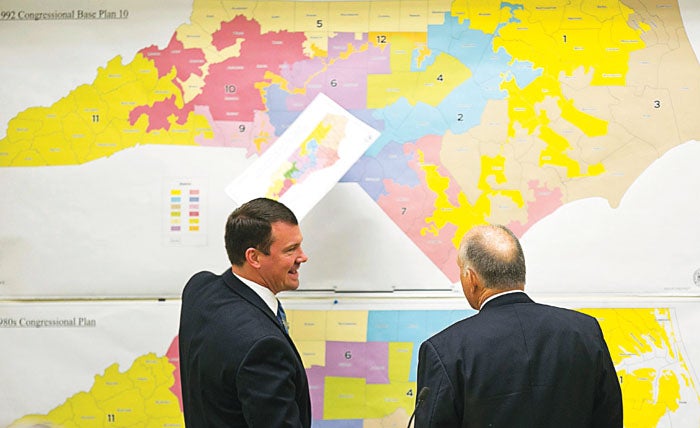Editorial: A victory for moderates
Published 12:20 am Thursday, January 11, 2018

- In this Feb. 16, 2016, file photo, Republican state Sens. Dan Soucek, left, and Brent Jackson, right, review historical maps during The Senate Redistricting Committee for the 2016 Extra Session in the Legislative Office Building at the N.C. General Assembly, in Raleigh, N.C. Federal judges ruled Tuesday, Jan. 9, 2018, that North Carolina's congressional district map drawn by legislative Republicans is illegally gerrymandered because of excessive partisanship that gave GOP a rock-solid advantage for most seats and must quickly be redone. (Corey Lowenstein/The News & Observer via AP, File)
The real winners in Tuesday’s court ruling against the General Assembly’s partisan congressional maps are not the Democrats that have been shut out of so many recent elections. If and when Democrats return to power, they’ll pick up where Republicans left off in drawing maps to their party’s advantage. And their districts will meet legal challenges too, as they have before.
No, if the state could truly break free of extreme partisan gerrymandering, the winners would be moderate voters, be they Democrat, Republican or unaffiliated. These are the people most severely silenced by redistricting schemes that play up to partisanship. The high-powered, data-driven mapping programs used for redistricting now have empowered a new brand of extremism, one that is immune to challenge. Any hopes of two differing sides reaching compromise in the middle — where many voters’ preferences lie — are dashed by the party in power’s overwhelming, lopsided strength.
The three judges who found North Carolina’s congressional maps unconstitutional partisan gerrymanders — judges appointed by Barack Obama, Jimmy Carter and George W. Bush — ruled unanimously, saying the map violated the 14th amendment. Past challenges to legislative and congressional maps centered on racial gerrymandering. A ruling on partisan gerrymandering — a redundant phrase if ever there was one — is something new in North Carolina. The historic decision signals that someone finally went too far, and that someone is the overwhelmingly conservative Republican leadership of the General Assembly. Going too far is the group’s specialty.
North Carolina is just one of more than two dozen states where bills have been filed to take redistricting out of the hands of lawmakers and give the job to new redistricting commissions. That seems the only way to get back to the American way — with voters choosing their representatives, rather entrenched representatives choosing voters.
The call for redistricting commissions goes beyond Democrats fighting a wave of Republican power; it’s a nationwide push ahead of the 2020 census to head off extreme partisanship in the next round of redistricting — and to give voters greater choice. Something in our political system has broken down. Fairer redistricting could go a long way toward fixing it.


